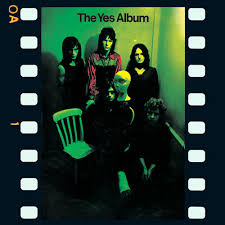
The Yes Album (1971)

1. Yours is No Disgrace
2. The Clap
3. Starship Trooper
4. I've Seen All Good People
5. A Venture
6. Perpetual Change
Not to be confused with the band’s first album, which was simply titled Yes. The name of this particular record is the only thing plain or unadventurous. By album three, The Yes Album, the band had found its groove—and then some. Of course, if sprawling 8-9 minute prog rock compositions aren’t your thing, best to exit stage left now. But for those who appreciate the form, this album is a masterclass—almost a blueprint—for how to do it right.
You can’t really talk about a Yes album without talking about changes in personnel, and sure enough, the lineup wheel spins again. This time, Peter Banks exits stage right and Steve Howe steps in—arguably the most iconic guitarist the band would ever have. Banks’ departure came on the heels of his dissatisfaction with the orchestral overkill on Time and a Word. Ironically, the strings are gone now, leaving one to wonder if the whole squabble was just a case of bad timing. While Banks certainly had his moments, Howe’s arrival marks a seismic shift. He’s not flashy in the way of a Page or a Slash—don’t expect screaming solos—but his layered playing creates the illusion of multiple guitarists weaving in and out of each other’s space. He doesn’t just play guitar—he populates the sonic landscape.
The Yes Album is anchored by three major epics—Yours Is No Disgrace, Starship Trooper, and Perpetual Change—each clocking in beyond the eight-minute mark. Long before the band’s future flirtations with self-indulgence, these tracks feel tight, purposeful, and brimming with collaborative energy. Squire’s bass, now fully baked into its signature twang-and-growl, cuts through the mix with authority. Bruford, meanwhile, seems far more in sync than he did on previous outings—channeling complexity rather than chaos. Tony Kaye remains understated throughout, which works just fine when Howe is blanketing every track with textures and counterpoints.
And then there’s Clap—yes, just Clap (though some pressings mistakenly added a "The"). Recorded live, the piece is a dazzling acoustic showcase for Howe. It’s not a flashy guitar hero moment—it’s a clinic in finesse and fingerwork. Most players wouldn’t dare attempt it. I’ve Seen All Good People, one of the band’s rare radio hits, also finds its home here. Yes, it’s been overplayed, but don’t let that dull its charm. The track’s pastoral beginnings morph into a propulsive jam, and it’s this duality—quiet introspection followed by exuberant payoff—that defines the album’s core strength.
A Venture closes out the deeper cuts—a relaxed, piano-driven tune that doesn’t quite soar, but doesn’t drag either. It's a palette cleanser, and maybe that’s exactly where it belongs.
Some fans still consider The Yes Album the group’s finest hour. Whether or not you agree, it’s undeniably one of their top-tier achievements. It’s confident without being smug, intricate without being obtuse, and packed with the kind of inventiveness that made progressive rock worth caring about in the first place. For many, this is where the story truly begins.
Go to the Next Review
Go back to the main page